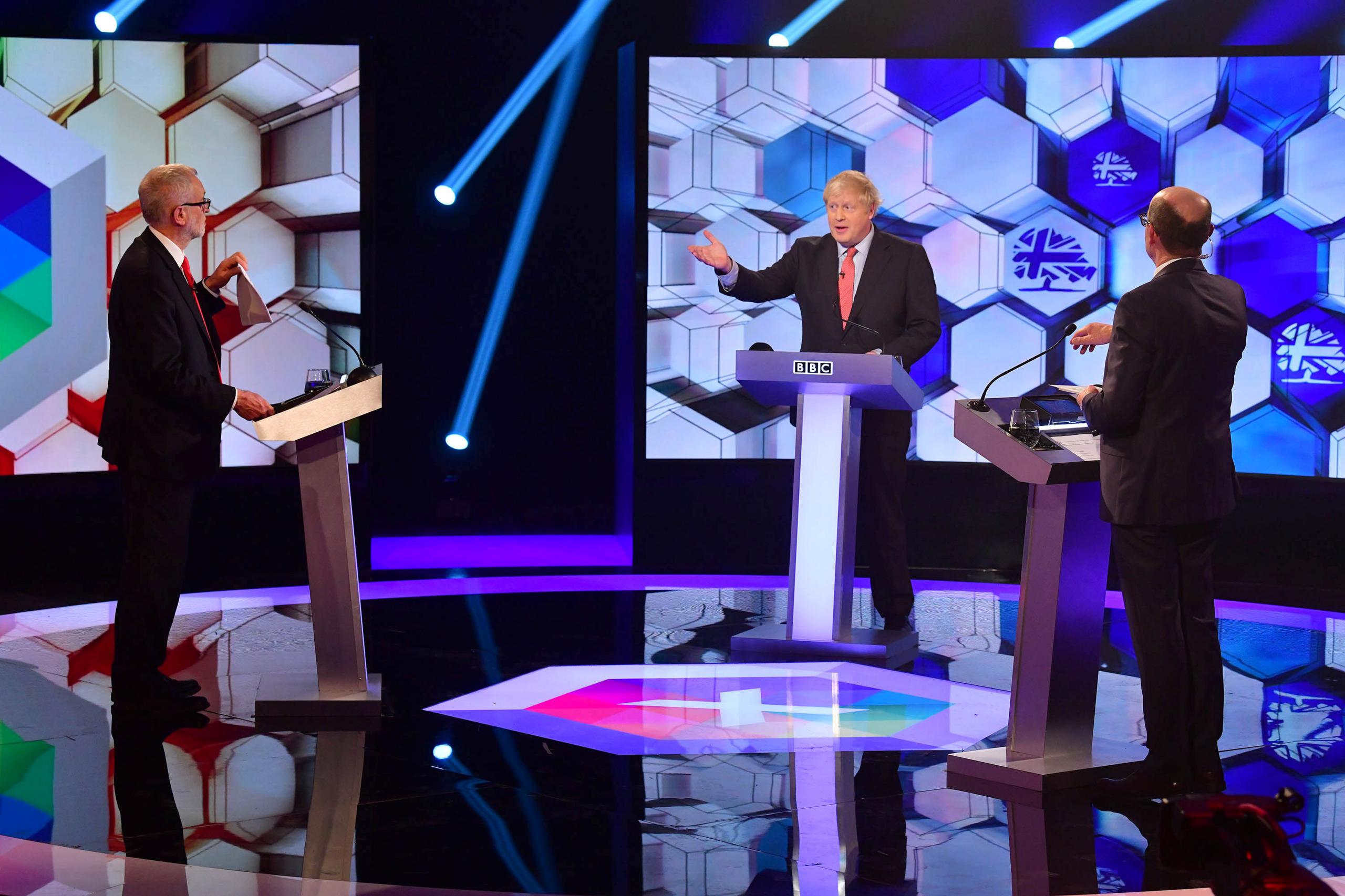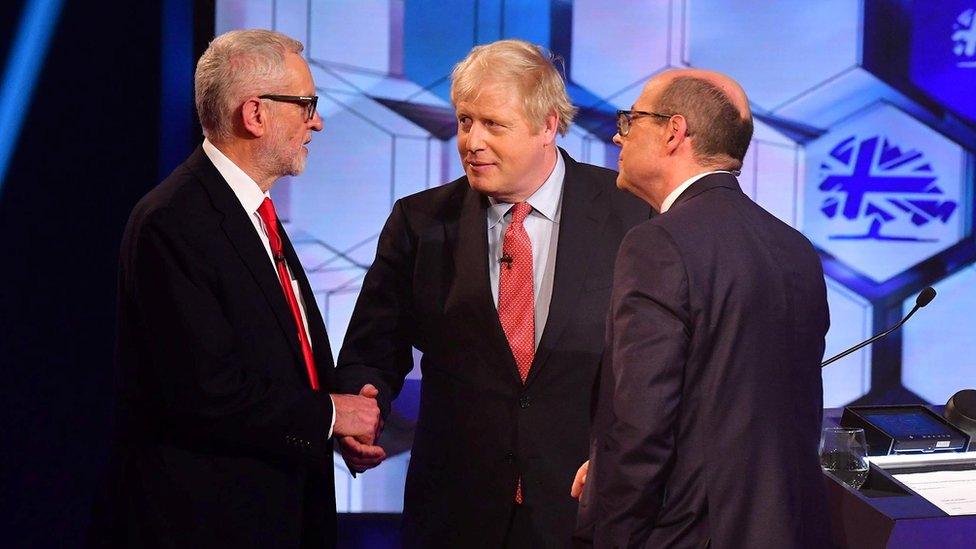General election 2019: Boris Johnson and Jeremy Corbyn clash over Brexit in BBC debate
- Published
- comments
Corbyn vs Johnson: BBC election debate roundup
Boris Johnson and Jeremy Corbyn clashed over Brexit in the final head-to-head debate before the 12 December election.
During the live debate, Mr Corbyn said Labour would bring Brexit "to an end" by negotiating a new deal and putting it back to the public in a referendum, alongside a Remain option.
Mr Johnson said he had "a wonderful deal", and would use it to take the UK out of the EU on 31 January.
Other topics covered included the NHS, security and Northern Ireland.
Early on in the debate - hosted by Today presenter Nick Robinson - the Labour leader said he would negotiate a new withdrawal agreement with the EU within three months before putting it to a final say referendum - alongside Remain - within six months.
The prime minister countered by saying he already had a withdrawal agreement in place, and would use it to leave the EU next month if he won a working majority in Parliament.
But Nick Robinson challenged Mr Johnson, pointing out that while he had a withdrawal deal in place, he did not have a trade deal with the EU, and so could not rule out a no-deal exit in January 2021.
Coming into the event, Labour and the Conservatives had spent the day arguing over how Mr Johnson's Brexit deal might affect Northern Ireland.
Labour said a leaked document showed Mr Johnson's agreement would have a "devastating" impact on Northern Ireland.
When the subject arose in the debate, Mr Corbyn said of his rival: "He spoke at a DUP conference and said there would be no [trade] restrictions [after Brexit] whatsoever, we now know there are restrictions."
But Mr Johnson was met with applause from the audience when he said he found it "slightly curious" to be lectured about the union by Mr Corbyn, referring to the Labour leader's past support for those who want to see a united Ireland.
Corbyn and Johnson clash over NHS
Like Brexit, the NHS has featured heavily in the campaign so far - and Friday's debate was no different.
Faith, a student nurse in the audience, asked how each leader would deal with a shortage of NHS nurses.
The Conservative leader said a government run by him would "encourage nurses overseas to come" to the UK "by shortening the time for their visa applications" and by reintroducing bursaries for training.
Mr Corbyn described the NHS as at "breaking point", adding that, under a Labour government, "£40bn in total would go into the NHS in order to fund it properly".
The Labour leader also repeated one of his main attack lines of the campaign - that a Tory government would allow the NHS to form part of a future trade deal with the US.
However, Mr Johnson described that claim as "Bermuda Triangle stuff".

Responding to the performances of Mr Corbyn and Mr Johnson, SNP leader Nicola Sturgeon tweeted: "That was utterly woeful. Two uninspiring men, both of them unsuited to be PM."
Meanwhile, Amelia Womack, of the Green Party, told the BBC: "I find it frustrating, as a younger woman, that we weren't discussing things that are relevant to my generation - whether that's house prices, rental prices, freedom of movement across Europe, or even zero-hour contracts."
Plaid Cymru's Liz Saville Roberts said the debate felt like a "shoddy end-of-term pantomime", and said both men displayed a "lack of honesty".
She added that, contrary to the claims of Mr Johnson, the "chaos" of Brexit "is going to go on", even if the UK leaves the EU next month.
And the Liberal Democrat Brexit spokesman Tom Brake said: "Tonight's debate was British politics at its worst. Two leaders offering nothing new, nothing different and neither being honest about the pain Brexit will cause our communities."

The prime minister and Mr Corbyn were also asked about security - an issue that has risen to prominence since the London Bridge attack on 29 November.
Both candidates were asked by an audience member if they would prioritise the safety of citizens over human rights.
Mr Corbyn said the choice was "not an either/or".
He added the UK could not have security "on the cheap", and so Labour would "back the police up" with an increase in officer numbers.
When it came to his turn, Mr Johnson referred to the London Bridge attack, and said it was "extraordinary and wrong" that the attacker was given automatic early release from prison after an earlier terrorism conviction.

Punches landed, but no knock-out blow

In a campaign where both parties have sought to repeatedly talk about their key themes, tonight did not diverge radically from the script.
Boris Johnson came under pressure on the issue of trust - and whether his Brexit plan would mean checks between Great Britain and Northern Ireland.
Jeremy Corbyn was once again pressed on his failure to pick a side on Brexit - and questioned on why Europe would offer Labour a new deal when so many frontbenchers back Remain.
Both men landed punches. But none of them were critical.
And given that polls suggest the Conservatives are ahead in the polls - that might suit Boris Johnson more than Jeremy Corbyn.


What are Johnson and Corbyn promising you?
Here's a concise guide to where the parties stand on key issues like Brexit, education and the NHS.
- Published9 December 2019
